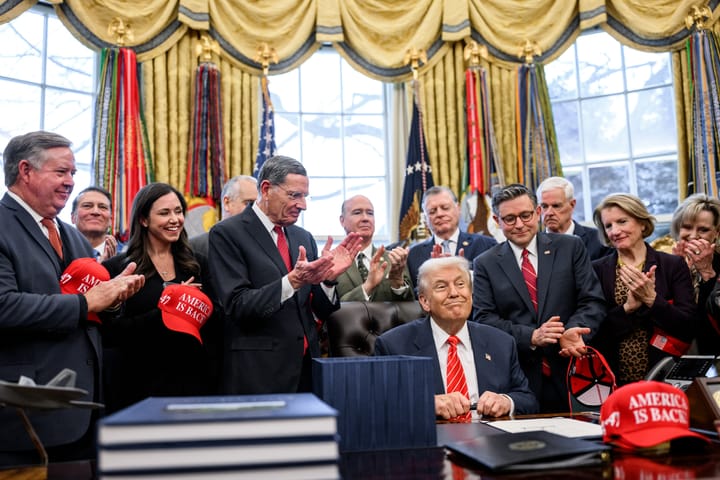The revolving door between Congress and K Street is well known in Washington. Plenty of U.S. representatives and senators leave office and join lucrative lobbying firms as quickly as they can. Some members of Congress are married to lobbyists, but thanks to 2007 legislation, those spouses are barred from lobbying their partners’ offices.
It’s a big problem “for a special interest—for a monied interest—to have a mechanism to write a big check straight into the family bank account of a sitting senator, to directly and dramatically increase the income, the personal wealth of a sitting senator,” said former Sen. David Vitter, a lobbyist with Mercury Public Affairs, when introducing his amendment in 2007 to ban lobbyists from directly lobbying their spouses’ offices. “That absolutely happens whenever you are going to allow spouses of sitting senators to lobby.”
However, congressional staffers are free from these kinds of restrictions. Top officials in the offices of numerous powerful members of Congress and congressional committees are married to people who are currently lobbying Congress, and there is neither a prohibition on this activity nor a disclosure requirement.
Sludge has found more than 20 cases in which key staffers are married to lobbyists. In some cases, staffers work for committees, or for top-ranking members of those committees, that preside over the industries that their spouses represent. Among Sludge’s findings, the appearance of conflicts of interest is significant: The spouse of an agricultural policy adviser to a top senator lobbies for a farm trade association; A House Transportation Committee staff director is married to a transportation industry lobbyist; A communications director whose boss sponsored a defense appropriations bill was married to a lobbyist for defense contractors.
“When a member or staffer shares a bed and a bank account with a registered lobbyist, the actuality — or at least the appearance of a conflict of interest — is forever present,” Craig Holman, a government affairs lobbyist at Public Citizen, told Sludge. “Pillow talk simply cannot be regulated, and both share the benefits of the lobbyist’s income.”
“Pillow talk simply cannot be regulated, and both share the benefits of the lobbyist’s income.”
Craig Holman, Public Citizen
Congressional staffers are immensely important in crafting legislation, as lawmakers have large workloads and are not experts on every topic. Staffers “are often the ones who draft and come up with legislation, and one of their key roles is offering vote recommendations,” Lee Drutman, an expert on lobbying and a senior fellow at New America, told Sludge. “Staffers are the central actors in the day-to-day functioning of Congress.”
“Obviously, it raises a huge conflict of interest if staffers and lobbyists work on the same issues,” Drutman said.
Lobbyist Conflicts: Defense
From 1999 to 2006, John Scofield was the communications director for the Republican contingent of the House Appropriations Committee, the body that approves funding for federal agencies. After that, he joined the Podesta Group as a lobbyist. In 2008, Scofield’s wife, Jen Hing, joined the Appropriations Committee as communications director for the Republicans.
In 2011, Scofield joined the lobbying firm S-3 Group, where he became a partner. Still there now, Scofield lobbied Congress on behalf of a host of companies in various industries. Sometimes, this lobbying coincides with legislation that his wife’s bosses were writing.
Scofield told Sludge that he and Hing are now separated but did not say when this happened and did not respond to specific questions about whether he had ever lobbied his wife’s office. The couple sold their home to Scofield in March 2017, according to public records.
Rodney Frelinghuysen (R-N.J.), the chair of the Appropriations Committee, was the primary sponsor of several Department of Defense appropriations bills including for fiscal years 2015, 2016, 2017 and 2018. In the second quarter of 2015, when Frelinghuysen introduced the Department of Defense Appropriations Act of 2016, Scofield lobbied Congress for aerospace and defense company General Dynamics on “funding for the Abrams Tank program in FY16 Defense Appropriations bill” as well as funding “for the Handheld, Manpack, Small Form Fit (HMS), the Warfighter Information Network – Tactical (WIN-T) System, and the Armored Multi-Purpose Vehicle (AMPV).”
General Dynamics appears to have done well: The final 2016 National Defense Authorization Act (NDAA), which sets budget and policy priorities, suggested roughly $685 million in WIN-T systems and $230 million for AMPVs. Last November, the U.S. Army concluded that it needed to replace its WIN-T systems because of vulnerabilities.
Also in the second quarter of 2015, Scofield lobbied on “issues related to the SBIR Program in the National Defense Authorization Act” for Innovative Defense Technologies. The business didn’t get much in the way for Defense Department Funding in the 2016 NDAA, but the following year, after more lobbying by Scofield, Innovative Defense Technologies scored $2.9 million in funding.
Besides having had access to an insider in Frelinghuysen’s orbit, Scofield appears to have curried favor with the representative by way of campaign donations. The lobbyist has given $9,400 to Frelinghuysen’s campaigns since 2013, including the maximum $2,700 donation in 2017, according to federal campaign finance records. General Dynamics has done the same; employees and the company PAC have combined to donate the third-largest total to Frelinghuysen’s campaign and leadership PAC during in the current election cycle, according to data compiled by the Center for Responsive Politics.
Scofield has continued to lobby Congress on appropriations for several other clients, including Koch Industries, Google, and the National Rifle Association’s Institute for Legislative Action.
In January, Frelinghuysen announced that he would not seek reelection this year.
Agriculture
For the past decade, Lisa Kelley Van Doren has been one of the top lobbyists for the agricultural industry. As vice president of government affairs for the National Council of Farmers Cooperatives (NCFC), Van Doren has overseen millions of dollars in lobbying expenditures and represented members including American Crystal Sugar, Dairy Farmers of America, and Blue Diamond in discussions with policymakers. She has lobbied on everything from crop insurance to immigration policy and regulation of commodity markets. Before joining the NCFC, Van Doren lobbied for the National Corn Growers Association.
At the same time, her husband Terry Van Doren has held key agricultural policy positions within the federal government. From 2005 to 2009, he held several top positions at the U.S. Department of Agriculture, and then in 2009 he became Sen. Mike Johanns’ (R-Neb.) legislative director. Johanns was a member of the Senate Agriculture Committee and the top-ranking Republican on the Domestic and Foreign Marketing, Inspection, and Plant and Animal Health Subcommittee. Currently, Mr. Van Doren works as a policy advisor on agricultural issues for Senate Majority Leader Mitch McConnell (R-Ky.).
Sen. McConnell likely played an outsize role in giving the NCFC something they have been lobbying for: inclusion of a so-called “grain glitch” fix in an omnibus appropriations bill. The NCFC had advocated for revising a provision of the 2017 tax bill that changed a benefit for farmers who sell their products to co-ops. The company worried that their big agribusiness co-op members could lose their competitive advantage under the provision. A deal to add the NCFC’s revision and other items to the omnibus was reported after McConnell met for a final round of negotiations with Minority Leader Chuck Schumer (D-N.Y.), House Speaker Paul Ryan (R-Wis.) and House Minority Leader Nancy Pelosi (D-Calif.). Lisa Van Doren lobbied the Senate on tax issues in the omnibus for the NCFC, according to a disclosure filed with the government.
The National Farmers Union, which represents more than 200,000 family-owned farms, opposed the NCFC-favored revision in the omnibus, saying the compromises that would have protected small farmers were “disregarded in favor of corporate interests.”
Terry Van Doren did not respond to a request for comment.
Transportation and Infrastructure
Lobbyist Mark Dedrick is a partner at Summit Strategies Government Affairs, a firm that specializes in representing municipalities and bodies governing public works projects. Many clients are either transportation companies or governments involved in transportation initiatives. Dedrick, according to his company bio, works “primarily on transportation, economic development and natural resource issues.”
Dedrick’s wife, Kathy Dedrick, is staff director for the Democrats in the House Transportation and Infrastructure Committee and was previously chief of staff to Rep. Peter DeFazio (D-Ore.), the ranking Democrat on the committee. Her husband frequently lobbies Congress and the Department of Transportation on behalf of governments and the transportation industry.
Dedrick told Sludge that he’s never lobbied his wife on behalf of any client. “Since Kathy became staff director for the Democrats on the Transportation and Infrastructure Committee I have a policy where I do not lobby the Democratic staff.” He also added, “I do not lobby Mr. DeFazio on any issues before the Transportation and Infrastructure Committee.”
“Mark has never lobbied me in this position or in any previous position,” Kathy Dedrick said.
While Dedrick’s policy appears to avoid conflicts of interest, it also highlights a loophole in congressional ethics requirements that led him to set his own policy.
In 2015, Dedrick lobbied Congress on the FAST Act, a bill that authorized funding for surface transportation programs, on behalf of Clackamas County, Oregon. The bill was sponsored by Rep. Rodney Davis (R-Ill.), a member of the House Transportation Committee, and cosponsored by Rep. Dan Lipinski (D-Ill.), a Democrat on that committee and a FAST Act cosponsor. The final law, which passed that December, included a total of $562,000 in funding for Marion and Clackamas Counties to support their ferry boat programs. On the conference committee that synthesized the House and Senate versions of the bill were several Transportation Committee Democrats, including Lipinski, DeFazio and Eleanor Holmes Norton (District of Columbia), the ranking member on the Transportation Subcommittee on Highways and Transit.
For Metro — the regional government of the Portland, Oregon metropolitan area — Dedrick lobbied Congress in 2017 on “economic development grants and programs,” among other things. The House Transportation Committee oversees economic development programs. For Clackamas County, Dedrick lobbied on implementation of the FAST Act, transportation appropriations, and economic development legislation, among other items.
For the Rail Security Alliance, a railroad industry trade group, Dedrick lobbied Congress on “policy related to the security of the United States rail sector” and “trade and investment policy related to the United States rail manufacturing industry” as recently as the first quarter of 2018.
Big Pharma
Claire Brandewie is an in-house lobbyist for McKesson, one of the three largest pharmaceutical distributors in the country. McKesson has been frequently implicated in perpetuating the opioid crisis. Prior to her stint at McKesson, Brandewie worked as legislative assistant for Sen. Tim Scott.
In the third quarter of 2017, when she began working for McKesson, Brandewie lobbied on corporate tax reform on behalf of the pharmaceutical giant, Lobbying disclosures show
Brandewie’s husband, Drew Brandewie, is Sen. John Cornyn’s (R-Texas) communications director. While Claire Brandewie was lobbying on tax policy, Cornyn was sitting on the Senate Finance Committee and on the powerful conference committee responsible for reconciling differences between Senate and House versions of the GOP’s Tax Cuts and Jobs Act.
Brandewie also lobbied on the implementation of Comprehensive Addiction and Recovery Act of 2016, which Cornyn cosponsored. Cornyn is also a member of the Senate Caucus on International Narcotics Control, which held a hearing on opioid abuse in 2014.
Drew Brandewie and McKesson did not respond to requests for comment.
More than 20 Couples
Van Doren, Dedrick, Hing and Brandewie make up only a handful of numerous staffer-lobbyist couples in Washington. Sludge conducted a partial review of congressional offices and found more than 20 current congressional staffers whose spouses are registered federal lobbyists. Some more examples:
- Rebecca Kelly Slaughter, a long-time legal adviser to Sen. Charles Schumer (D-N.Y.) specializing in telecom issues, is married to Justin Slaughter, a partner at lobbying firm Mercury Strategies, which lobbies almost exclusively for telecom companies. In May, Slaughter became a commissioner on the Federal Trade Commission, which oversees telecom and other industries.
- Eric Burgeson is chief of staff for Rep. Bill Shuster (R-Pa.), who is chair of the House Transportation and Infrastructure Committee. Burgeson’s wife, Christine McCarlie Burgeson, is a top lobbyist for American Airlines and lobbied Congress on an aviation bill that Shuster sponsored. Shuster has found himself in the spotlight over one of his relationships; in 2015, he admitted to having a relationship with an American Airlines vice president of global government affairs—a job title the woman shares with Burgeson and a few other executives.
- Ben Khouri, press secretary for Sen. Richard Burr (R-N.C.), is married to Google lobbyist Amanda Faulkner. Burr, chair of the Senate Intelligence Committee, drafted a Foreign Intelligence Surveillance Act reauthorization bill, and Faulkner lobbied on issues related to the Foreign Intelligence Surveillance Act in the first quarter on 2018, when it became law.
- Daniel Rubin, communications director for the Democrats on the House Ways and Means Committee, works under ranking member Richard Neal (D-Mass.). His wife, Robin Rubin, lobbies for foundations at Van Scoyoc Associates. This year, she lobbied on a bill concerning taxes and charity organizations, which is sitting in the Ways and Means Committee.



